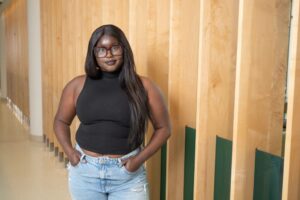This story originally appeared in SOURCE, the news website of Colorado State University.
As a young child, Helen Obuna moved from Egypt to the United States with her family. She remembers the difficulty of the transition having to learn English and navigate the cultural differences in her communities. Despite these challenges, her curiosity to learn and her perseverance kept her moving forward.
After graduating high school, Obuna accepted an offer letter to attend Colorado State University (CSU), leading to her journey as a Ram and a first-generation college student. As a sophomore, she received the Reisher Scholarship, which she discovered through the CSU financial aid website. She appreciated the scholarship’s focus on supporting students from diverse and underrepresented backgrounds.

Obuna majored in biological anthropology and sociology with a focus on criminology and criminal justice. During her studies, she found a passion for research, getting involved with numerous projects on and off campus. Over the summer of 2023, she worked on a human microbiome research project, studying urbanization and diet and how it impacts Black Americans’ health compared to other populations. She also participated in the Multicultural Undergraduate Research Art and Leadership Symposium, presenting her work on a project titled “Being Trans at CSU.” The project received two awards through the symposium. Obuna has also dedicated her time to working at Rams Against Hunger since her sophomore year, strengthening her connection to the CSU Community.
The Reisher Scholarship provided Obuna with the financial support she needed to cover essential expenses like rent, car insurance, and groceries. This relief meant she could embrace being a student, without having to juggle multiple jobs or worry about paying bills. It also allowed her to get involved with the numerous research opportunities that she did.
Reflecting on her journey, Obuna shares valuable advice with other students: “Don’t be afraid to make connections with faculty and staff. I know a lot of them may seem unapproachable, but they’re there to support you.” And for students needing financial support, she added, “Keep applying for scholarships. The worst thing that they can say is no.”
Obuna hopes to further her research in a Ph.D. program for medical anthropology and looks forward to getting her first job after graduation.
“I’m really excited to use frameworks like Black feminist theory,” Obuna said. “I’m really excited to center Black women in my work because I am a Black woman, and it’s something that I haven’t been able to do yet. So, I’m really looking forward to furthering my education in that way.”
